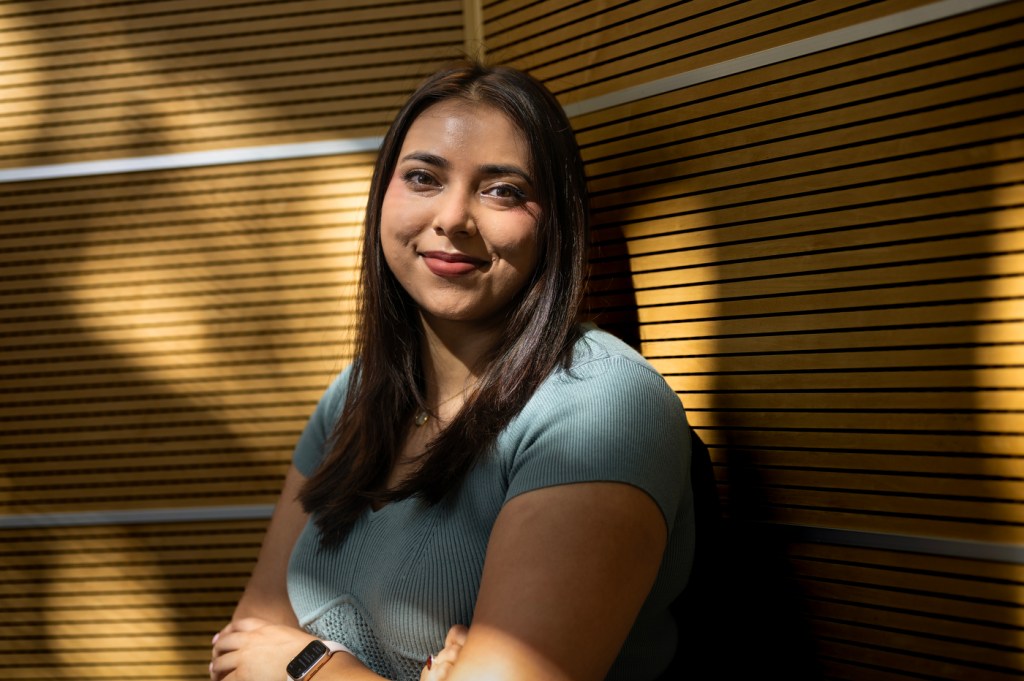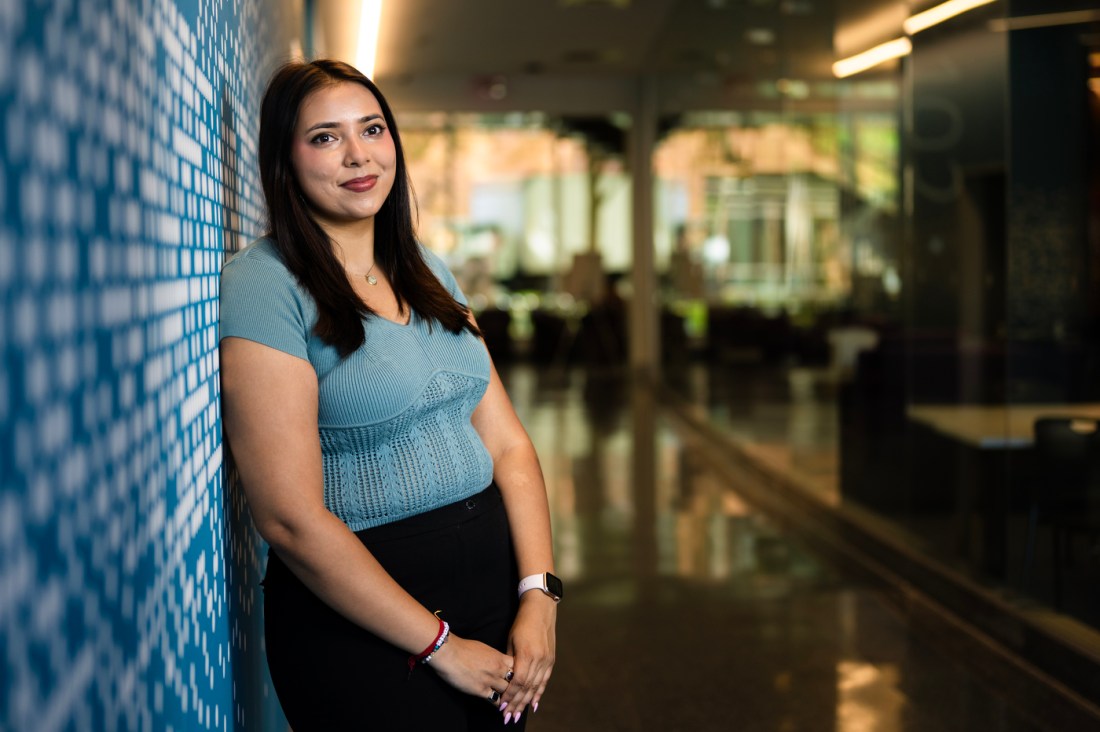On her free speech mission, this Northeastern student has turned a negative into inspiration

Northeastern University senior Pratika Katiyar has experienced vitriol for her opinions.
In February 2023, she wrote an opinion piece that was published by CNN on the importance of student press freedom in the midst of state laws restricting curricula.
Katiyar says some of the feedback was “so hateful” that she says she started thinking about how online harassment could silence journalists.
But Katiyar would not be silenced. Instead she strengthened her resolve to ensure that policy and technology protects speech rather than silences it.
“I started looking at everything from a First Amendment perspective,” Katiyar says. “I think the First Amendment is really, really important. It’s what interests me.”
She wants to be someone who helps bridge the policy gap when it comes to online vitriol.
“I think there’s lots of legal remedies and policy remedies to fix some of these issues that we’re seeing online because technology often outpaces the regulation,” says Katiyar, who is majoring in business administration and communication studies with a concentration in finance.
She acknowledges that it is a rather “broad and general” major, but that’s why she chose it.
“It allowed me to find something within that and apply it to a bunch of different fields,” Katiyar says.
In fact, the interdisciplinary opportunities available at Northeastern are what drew Katiyar to the university, she says.
Katiyar has taken full advantage — completing a “transformative” co-op in the privacy department at Amazon, where she monitored data privacy legislation; serving as president of the Women in Business club; writing a thesis on the use of AI technologies to monitor the Southern border; and dancing with the No Limits dance team.
“I do have a ton of different backgrounds, and I would argue that they’ve all kind of somewhat complemented each other,” Katiyar says.

Katiyar says all of her pursuits were grounded in her advocacy for free speech, which she calls “a fundamental human right.”
“At my core, I think I’m a free speech advocate,” Katiyar says. “I think everyone should be able to talk about things that matter to them, and we see too often that young people, people of color, and women are being censored or silenced, and I am definitely not OK with that.”
She traces this belief to her experience growing up as the child of immigrants — her biggest cheerleaders, she says, proudly — in the Northern Virginia suburbs of Washington, D.C., where trips to the city would always involve a glimpse of Capitol Hill, a protest or a large-scale event.
“That was my first exposure to seeing firsthand how policy and politics actually play into our everyday lives, and I think that’s one of the reasons why I’m really opinionated,” Katiyar says.
But she didn’t find the perfect outlet for those opinions until as a student at Thomas Jefferson High School for Science and Technology in Alexandria, Virginia, hanging out in Room 39 — the journalism room.
“That was where I found my own voice,” Katiyar says. “I instantly was drawn to storytelling and policy and bridging that gap between technology and storytelling and policy.”
But in addition to her voice, Katiyar also found some administrative roadblocks to her reporting about the high school’s diversity efforts.
Featured Posts
“It wasn’t outright censorship, but it was almost like maybe we shouldn’t write this story — it was almost self censorship,” Katiyar says. “I looked into it and I realized that this is something that was going on at schools across the country, and as a result of a Supreme Court case called Hazelwood v. Kuhlmeier, which basically allows students to be censored at any point if their administrators have a reason.”
Katiyar connected with the Student Press Law Center and joined its “New Voices” movement for legislation to reverse the effects of Hazelwood v. Kuhlmeier and restore First Amendment protections for students and student journalists.
She ended up lobbying state lawmakers, and testified for the legislation at the Virginia Statehouse.
She continued her advocacy while at Northeastern.
Since her first year, Katiyar has served on the board of directors for the Student Press Law Center.
She has also worked for several years as a research assistant at Harvard Law School’s Berkman Klein Center for Internet and Society, researching issues such as ethical governance of artificial intelligence, better content moderation practices and reproductive freedom.
“It’s a good complement to some of the coursework I did at Northeastern and to my co-op experience,” Katiyar says.
Finally, she took her interests with advocacy work to PEN America, lobbying lawmakers and tech leaders to better implement policies that protect free expression and human rights.
“Too often, I think technologies only take into account a certain demographic, or they don’t think of the effects that they may have,” Katiyar says. “Like right now, what we’re seeing with AI and deep fakes, we think it’s so cool, but then you see things going around that are harming women and harming children.”
So, she’s already done advocacy, policy and journalism, worked with the nonprofit sector and in Big Tech, what’s next for Katiyar?
Well, she admits she has a bit of the “Senior Scaries,” but Katiyar sees law school in the future, policymaking, and possibly government and public interest work.
“I just want to be somewhere where I can have a seat at the table to create effective policy changes,” Katiyar says. “I really do want to be able to advocate for other people and have that legal background and also just ensure that we’re protecting everyone with better legislation and better policies. But I honestly don’t know where that will lead me.”
Wherever she ends up, however, she will have earned plenty of places at plenty of tables. In fact, she already has.
Katiyar was named to the media company Her Campus’s 22 Under 22 list, Poets & Quants’ 2024 Best and Brightest Business Majors and — most recently — to Glamour Magazine’s College Women of the Year 2024 class. She has been featured in Teen Vogue.
“She is a great student, super insightful about the intersection of law, current events, and new technologies, and she has been a clear standout from day one,” said Ryan Ellis, associate professor of communication studies at Northeastern and Katiyar’s thesis adviser.
“Whatever she does — whatever form it takes — I know it will make a contribution to the public interest,” Ellis continues. “I’m curious to see what she does next.”











